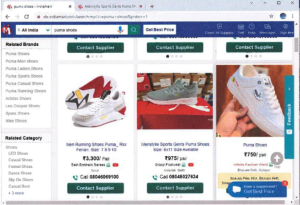Introduction
On 2nd June 2025, in the case of IndiaMart Intermesh Ltd. v. Puma SE,[i] the Delhi High Court ruled on a trademark infringement dispute between the companies Puma SE (“Petitioner”) and IndiaMart Intermesh Limited (“IndiaMart”). The Division Bench of the Delhi High Court overruled the earlier order that was given by a Single Bench, and held that IndiaMart could continue using the wordmark “Puma” as an option, in its drop-down and search menu for seller registration. However, the Court sustained the direction that IndiaMART must remove infringing listings upon receiving notice and improve its due diligence mechanisms.
Background
The dispute started when a suit was filed by Puma alleging that counterfeit products were being listed and sold on IndiaMart by sellers which were not authorized, using product images which had Puma logo and its form strip logo. Puma also argued that IndiaMart’s software which used the ‘PUMA’ logo in its drop-down menu and keyword suggestions during seller onboarding amounted to trademark infringement and inducement of counterfeiting.
It said these practices took IndiaMart outside the scope of ‘safe harbor’ protection as granted under Section 79(1) of the Information Technology Act, 2000 (“IT Act”).
Puma, therefore, was seeking a decree of permanent injunction to restrain IndiaMart from using, facilitating, or offering the trademark ‘PUMA’ as a brand suggestion, keyword, or search term on its website, or from any usage of the trademark ‘PUMA’ in any manner that amounted to trademark infringement. Puma had also sought to restrain IndiaMart from passing off its goods and services as those of Puma. As an example of such use, screenshots were noted by the Court as given hereinbelow:

Observations of the Single Judge
The Single Judge bench of the Delhi High Court had earlier granted the interim injunction in favour of Puma. The Court held that:
- IndiaMart’s use of the Puma mark in drop down menu and on various product images amounted to “use” of trademark as explained under Sections 2(2)(b), 2(2)(c)(i), and 29(6)(d) of the Trade Marks Act, 1999 (“Trade Marks Act”).
- IndiaMart’s use was not just facilitation but was considered as active involvement in trademark misuse.
- IndiaMart’s use disqualified IndiaMart from ‘safe harbour’ protection under Section 79 of the IT Act.
- and that IndiaMart had failed to show due diligence as required under the Information Technology (Intermediary Guidelines and Digital Media Ethics Code) Rules, 2021 (“IT Rules, 2021”).
Accordingly, IndiaMart was restrained from using the Puma mark in its registration interface and was directed to remove infringing listings by the Single Judge bench.
Sidenote: Safe Harbor protection principles
Safe harbor is a principle where protection is granted to intermediaries from any actions or posts of its users, and this principle is provided under Section 79 (1) of the IT Act. Section 79(1) of the IT Act provides that an intermediary will not be held liable for any third-party information, data, or communication link it hosts or makes available, as long as it complies with the conditions laid out in Sections 79(2) and 79(3). In order to claim protection of ‘safe harbour’ under Section 79(1) of the IT Act, the following checklist of duties and conditions for intermediaries is required:
- Limit their role to providing access to a communication system where third-party information is transmitted, stored, or hosted.
- Not initiate the transmission.
- Not select the receiver of the transmission.
- Not select or modify the content of the transmission.
- Observe due diligence in performing their duties under the law.
- Follow any guidelines prescribed by the Central Government.
In lieu of the decision in Just Rights For Children Alliance v. S. Harish,[ii] the following compliance has been added:
- Meet the requirements of POCSO, particularly under Section 19 to report child pornography to Special Juvenile Police Unit or local police, in addition to National Centre for Missing & Exploited Children (NCMEC).
See our post on the addition of another duty to claim protection under safe harbor.
Contentions of IndiaMart
IndiaMart challenged the impugned judgment broadly on the grounds that the learned Single Judge mischaracterised its role by wrongly treating its platform as a typical e-commerce website facilitating the sale of third-party goods. IndiaMart argued that the inclusion of the trademark ‘PUMA’ in its drop-down menu did not amount to trademark use under Section 29(1) of the Trade Marks Act, and further does not lead to a likelihood or actual confusion under Section 29(2).
IndiaMart asserted that the use of ‘PUMA’ in the seller interface did not constitute active promotion or recommendation and that the finding that this goes beyond the scope of an intermediary thereby disentitling it from safe harbour under the IT Act was not as per its interpretation. Finally, IndiaMart submitted that it has complied with the due diligence obligations under Section 79 of the IT Act and should not be held liable for infringing acts of third-party sellers using the platform.
Analysis by the Court
Visibility of Brand Name and Infringement
The Court noted that IndiaMart was an intermediary under Section 2(1)(w) of the IT Act. IndiaMart described its role as an online business to business (B2B) discovery platform where sellers, particularly MSMEs and individuals, could independently list their products and create catalogues. The drop-down menu was part of the registration process to help sellers provide more specific descriptions of their goods, thereby making listings more relevant for buyers searching for particular products.
The Court examined screenshots of the registration interface and observed that suggestions like “Puma Shoes” or “Puma T Shirt” appeared as part of a prompt encouraging sellers to add precise product names. It found that listings resulting from such entries typically displayed detailed seller information, product descriptions, prices, and ratings. For example, one listing had brand listed as PUMA and seller details clearly visible. The Court noted that the platform merely collated and displayed seller inputs, and the presence of brand names in the suggestion list was aimed at enhancing the accuracy of listings for buyers, not as an endorsement or creation of content by IndiaMart itself.
The Division Bench held that merely offering a brand name as a descriptor in a registration form could not, by itself, amount to dishonest practice or infringement. The Court drew a distinction between platforms like e-commerce hypermarkets and listing services such as yellow pages, stating that IndiaMart’s role appeared closer to the latter. It observed that the use of brand names in the drop-down was intended to maintain search accuracy and prevent spelling inconsistencies, rather than to mislead consumers or promote counterfeits. The Court concluded that, prima facie, Section 29 of the Trade Marks Act was not attracted in this context and that IndiaMart’s use of brand names for classification did not amount to trademark infringement.
Abetment of Trademark Infringement?
The Court considered whether IndiaMart could be said to have aided and abetted trademark infringement merely by providing “PUMA” as a selectable option in its drop-down menu. The Division Bench held that the legal concept of “aiding and abetting” involves an element of shared intent, and there was no material to suggest that IndiaMart shared such intent with infringing sellers. The Court found that merely offering a dropdown option, especially when sellers were not compelled to use it, could not support a presumption of IndiaMart intentionally aiding infringement.
The Court emphasized that IndiaMart’s role was limited to providing a searchable database of seller listings and that all negotiations and transactions occurred independently between the buyer and seller, outside IndiaMart’s control. The dropdown menu, according to the Court, simply served to organize listings and facilitate searches—not to validate the authenticity of the goods. It noted that sellers were free to bypass the dropdown and enter custom product descriptions, further undercutting the allegation of intent to infringe.
Accordingly, the Court held that there was no prima facie basis to conclude that IndiaMart aided or abetted infringement by merely providing a dropdown selection option.
Safe Harbour protection under Section 79(1) of the IT Act
The Court examined whether IndiaMart could claim safe harbour protection under Section 79(1) of the IT Act. The Court held that IndiaMart functioned as a B2B listing platform providing seller information and not as a direct seller of goods. It found no evidence, prima facie, that IndiaMart’s value-added services were central to the present grievance or that it intentionally encouraged infringement. However, it emphasised that if such services are later found to facilitate infringement, they may warrant a separate legal examination.
The Court clarified that IndiaMart must comply with due diligence obligations under the IT Rules, 2021, including removing infringing content upon gaining ‘actual knowledge’.
Sidenote: Meaning of ‘actual knowledge’
Under the IT Rules, platforms must take down content upon receiving “actual knowledge”. Before the IT Rules, 2021, the earlier Rule 3(4) of the IT (Intermediaries Guidelines) Rules, 2011, required intermediaries to act within 36 hours upon gaining such knowledge, but did not define what counted as “actual knowledge”. The IT Rules, 2021 clarified that “actual knowledge” arises only from a court order or government notification, requiring removal within 36 hours (or 24 hours for sexual content under Rule 3(2)(b)). This obligation coexists with the Copyright Act, 1957.
It was held in Myspace v. Super Cassettes[1] that both statutes must be read harmoniously. Under Rule 75 of the Copyright Rules, 2013, access to allegedly infringing content must be suspended within 36 hours for 21 days or until a court order is received.
The Court noted that IndiaMart had grievance redressal mechanisms and terms of service prohibiting counterfeit listings, but also found that IndiaMart should take more proactive steps, such as securing express undertakings from sellers and preventing repeat infringers from re-registering with the same credentials.
It held that eliminating brand references entirely at the listing stage, as implied by PSE’s argument, was neither required by law nor practically reasonable. Thus, the Court found no basis at this stage to deny IndiaMart the safe harbour protection under Section 79(1) of the IT Act.
Conclusion
The Court concluded that IndiaMart is not required to be restrained from offering brand names, including “PUMA,” as selectable options in its drop-down menu during seller registration, provided it makes reasonable efforts to prevent the hosting or display of infringing content. It clarified that merely enabling sellers to describe their products by brand names does not, in itself, amount to trademark infringement or justify restrictions on the platform’s functionality.
Accordingly, the Court set aside the part of the Single Judge’s order that prohibited IndiaMart from offering “PUMA” as a selectable term. However, it upheld the direction requiring IndiaMart to promptly take down infringing listings using the PUMA mark once such listings are brought to its notice.
End Notes:
[1] Myspace Vs. Super Cassettes Industries Ltd., FAO(OS) 540/2011, C.M. APPL.20174/2011, 13919 & 17996/2015.
[i] FAO(OS)(COMM) 6/2024, CM APPL. 2216 & 2219/2024
[ii] Criminal Appeal Nos. 2161-2162 Of 2024.












